Theology
St. Theophan the Recluse: The Nativity of Christ
8. January 2012 - 11:27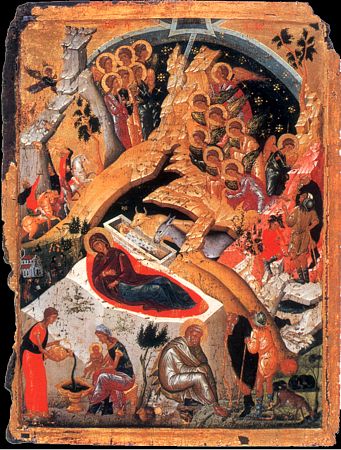 Glory to Thee, O Lord! Once again we greet the awaited bright days of Christ's Nativity. Let us be glad and rejoice. In order to raise our festivities to a higher level in these days, the Holy Church has intentionally instituted a fast before them—a certain amount of constraint, so that as we enter the festive period we might feel as though we were coming out into freedom. Nevertheless, the Church in no way desires that we give ourselves over to mere sensual delights and fleshly pleasures. Since the Church has from olden times called these days sviatki ("holy days"), they require that our very rejoicing on these days be holy, as they are holy. So that those who rejoice might not forget themselves, the Church has placed a short hymn upon our lips to glorify the newborn Christ, by which the flesh is settled down and the soul is uplifted, showing the proper occupations for these days: "Christ is born, give ye glory," and the rest. Glorify Christ; glorify Him, so that by this doxology your heart and soul might delight, and thereby silence any urge for various other deeds and occupations that might promise some kind of pleasure. Glorify Christ: this does not mean that you have to compose lengthy songs of praise to Christ—no. But if when contemplating or hearing about the birth of Christ the Savior, you involuntarily cry out from the depths of your soul, "Glory to Thee, O Lord, that Christ is born!"—this is sufficient. This will be a quiet hymn of the heart, which will nevertheless pass through to heaven and enter in to God Himself. Repeat a little more clearly to yourself what the Lord has wrought for us, and you will see how natural this exclamation now is. So that this might be easier for us, we shall compare it to the following incident:
Glory to Thee, O Lord! Once again we greet the awaited bright days of Christ's Nativity. Let us be glad and rejoice. In order to raise our festivities to a higher level in these days, the Holy Church has intentionally instituted a fast before them—a certain amount of constraint, so that as we enter the festive period we might feel as though we were coming out into freedom. Nevertheless, the Church in no way desires that we give ourselves over to mere sensual delights and fleshly pleasures. Since the Church has from olden times called these days sviatki ("holy days"), they require that our very rejoicing on these days be holy, as they are holy. So that those who rejoice might not forget themselves, the Church has placed a short hymn upon our lips to glorify the newborn Christ, by which the flesh is settled down and the soul is uplifted, showing the proper occupations for these days: "Christ is born, give ye glory," and the rest. Glorify Christ; glorify Him, so that by this doxology your heart and soul might delight, and thereby silence any urge for various other deeds and occupations that might promise some kind of pleasure. Glorify Christ: this does not mean that you have to compose lengthy songs of praise to Christ—no. But if when contemplating or hearing about the birth of Christ the Savior, you involuntarily cry out from the depths of your soul, "Glory to Thee, O Lord, that Christ is born!"—this is sufficient. This will be a quiet hymn of the heart, which will nevertheless pass through to heaven and enter in to God Himself. Repeat a little more clearly to yourself what the Lord has wrought for us, and you will see how natural this exclamation now is. So that this might be easier for us, we shall compare it to the following incident:
Leo the Great of Rome, Homily 21, On the Nativity, 1
7. January 2012 - 11:231. All Share in the joy of Christmas
Our Saviour, dearly-beloved, was born today: let us be glad. For there is no proper place for sadness, when we keep the birthday of the Life, which destroys the fear of mortality and brings to us the joy of promised eternity. No one is kept from sharing in this happiness. There is for all one common measure of joy, because as our Lord the destroyer of sin and death finds none free from charge, so is He come to free us all. Let the saint exult in that he draws near to victory. Let the sinner be glad in that he is invited to pardon. Let the gentile take courage in that he is called to life. For the Son of God in the fullness of time which the inscrutable depth of the Divine counsel has determined, has taken on him the nature of man, thereby to reconcile it to its Author: in order that the inventor of death, the devil, might be conquered through that (nature) which he had conquered. And in this conflict undertaken for us, the fight was fought on great and wondrous principles of fairness; for the Almighty Lord enters the lists with His savage foe not in His own majesty but in our humility, opposing him with the same form and the same nature, which shares indeed our mortality, though it is free from all sin. Truly foreign to this nativity is that which we read of all others, no one is clean from stain, not even the infant who has lived but one day upon earth" (Job 19.4). Nothing therefore of the lust of the flesh has passed into that peerless nativity, nothing of the law of sin has entered. A royal Virgin of the stem of David is chosen, to be impregnated with the sacred seed and to conceive the Divinely-human offspring in mind first and then in body. And lest in ignorance of the heavenly counsel she should tremble at so strange a result , she learns from converse with the angel that what is to be wrought in her is of the Holy Ghost. Nor does she believe it loss of honour that she is soon to be the Mother of God. For why should she be in despair over the novelty of such conception, to whom the power of the most High has promised to effect it. Her implicit faith is confirmed also by the attestation of a precursory miracle, and Elizabeth receives unexpected fertility: in order that there might be no doubt that He who had given conception to the barren, would give it even to a virgin.
When and How Should We Celebrate the New Year?
3. January 2012 - 9:44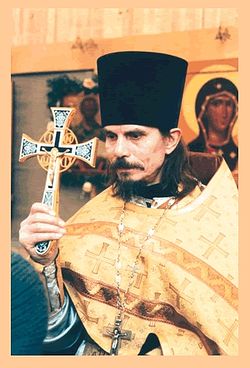 Throughout the Nativity fast, there are not a few Church feast days on which the typicon allows fish and wine. Christian love and discernment allows an Orthodox Christian to sit at the table with his friends and drink a glass of wine in the normal manner. We always serve a moleben of Thanksgiving on civil New Year's Eve, and that is the proper thing to do. Some people mistakenly believe that Orthodox Christians should not participate in this event. "That has nothing to do with us," they say. "We are on another calendar, and New Year's Day can only come according to the old calendar—that is, on January 14."
Throughout the Nativity fast, there are not a few Church feast days on which the typicon allows fish and wine. Christian love and discernment allows an Orthodox Christian to sit at the table with his friends and drink a glass of wine in the normal manner. We always serve a moleben of Thanksgiving on civil New Year's Eve, and that is the proper thing to do. Some people mistakenly believe that Orthodox Christians should not participate in this event. "That has nothing to do with us," they say. "We are on another calendar, and New Year's Day can only come according to the old calendar—that is, on January 14."
There was a time in Russia when New Year's Day was celebrated on September 1, and it coincided with the Church New Year. Even now, we begin the cycle of our Church feasts from that day. However, under Tsar Peter I, the civil New Year was transferred to January 1, as it was in Europe. In general, this date is quite relative, and in the final analysis we could choose any date at all to begin the New Year.
The Incarnation and Humility
28. December 2011 - 16:31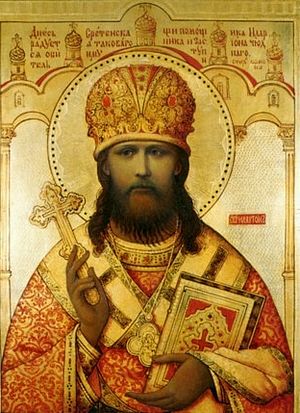 This treatise by Holy Hieromartyr Hilarion (Troitsky) (1886–1929) on the incarnation of Our Lord and Savior Jesus Christ was published in the early twentieth century, when European scholars (particularly in Germany) were blatantly re-writing Christian history and theology. Their light-minded efforts have resounded to our day, reiterating themselves in modern articles, books, and films, rendering St. Hilarion’s treatise ever relevant as well.
This treatise by Holy Hieromartyr Hilarion (Troitsky) (1886–1929) on the incarnation of Our Lord and Savior Jesus Christ was published in the early twentieth century, when European scholars (particularly in Germany) were blatantly re-writing Christian history and theology. Their light-minded efforts have resounded to our day, reiterating themselves in modern articles, books, and films, rendering St. Hilarion’s treatise ever relevant as well.
With modern religious society’s cooling toward God’s Church, there are not likely to be many people who feel in full measure how the Church celebrates the remembrance of “The Incarnation of our Lord and God and Savior Jesus Christ”. There is perhaps only one attribute that has not yet been forgotten—the irmos, “Christ is born, give ye glory…” is sung in Church more than a month before the feast [of the Nativity] itself. After all, the Church dedicates whole weeks to preparation for the feast. In parish churches the advent of the great feast is not very noticeable, because the Church typicon has lost there all its charm, its profound theology; there the feast comes on almost immediately. I will not even talk about the fact that in the life of the laity, the feast’s approach is felt only in an increase of domestic hustle-bustle. The original element of Church life can only be caught these days in the monasteries, most notably in the lavras (especially the Kiev-Caves Lavra), where not a single canon or a single stichera is skipped. These hymns are given full voice beneath the monastic church domes and fill all present with their content. Hearing them, the Faithfull’s consciousness breaks away from the earth; not for one day or for a few hours, as in the parish churches—no, it breaks away from the earth long before the feast and remains in the heights of spiritual upliftment, spiritual rapture, for nearly an entire week. Only the Bright Resurrection of Christ is celebrated more radiantly. But in a certain sense, the Nativity services even exceed the Paschal services; and if they do not exceed them, then they at any rate bear an absolutely special character. The Paschal service is one triumphant, joyful, exultant hymn by the Church to the Risen Lord. The Nativity service has a special element of theology. Throughout the cycle of the Church’s service books, you will not find more abundant dogmatic content than in the services for the Nativity. Here, in short but powerful expressions is contained the fundamental idea of Christianity—the renewal of corrupt human nature by the incarnation of the Son of God.
St Spyridon the Wonderworker and Bishop of Tremithus
27. December 2011 - 12:09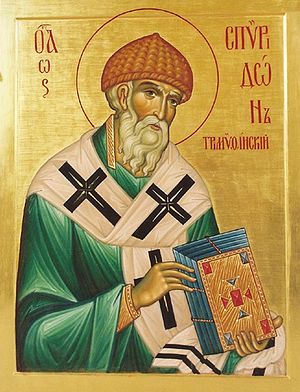 Saint Spyridon of Tremithus was born towards the end of the third century on the island of Cyprus. He was a shepherd, and had a wife and children. He used all his substance for the needs of his neighbors and the homeless, for which the Lord rewarded him with a gift of wonderworking. He healed those who were incurably sick, and cast out demons.
Saint Spyridon of Tremithus was born towards the end of the third century on the island of Cyprus. He was a shepherd, and had a wife and children. He used all his substance for the needs of his neighbors and the homeless, for which the Lord rewarded him with a gift of wonderworking. He healed those who were incurably sick, and cast out demons.
After the death of his wife, during the reign of Constantine the Great (306-337), he was made Bishop of Tremithus, Cyprus. As a bishop, the saint did not alter his manner of life, but combined pastoral service with deeds of charity.
There is a St. Nicholas!
20. December 2011 - 12:07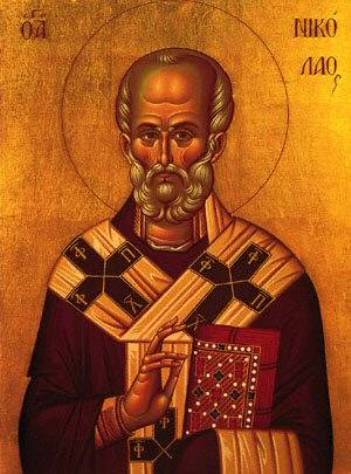 The question, "Is there a Santa Claus?" has led by association to the question, "Was there a St. Nicholas?" among secular historians. The issue seems to revive every December before Christmas, although everyone knows that St. Nicholas's feast day does not fall on Christmas, and he is only associated with the Nativity of Christ by the proximity of his own feast day. Well, and because he always gave people gifts.
The question, "Is there a Santa Claus?" has led by association to the question, "Was there a St. Nicholas?" among secular historians. The issue seems to revive every December before Christmas, although everyone knows that St. Nicholas's feast day does not fall on Christmas, and he is only associated with the Nativity of Christ by the proximity of his own feast day. Well, and because he always gave people gifts.
Holy Hierarch Nicholas of Myra and Lycia is commemorated by the Church on December 6/19. Anyone who has ever prayed to St. Nicholas for help knows beyond a shadow of a doubt that he not only did exist, but still does exist, for our God is a God of the living (cf. Mt. 22:32).

